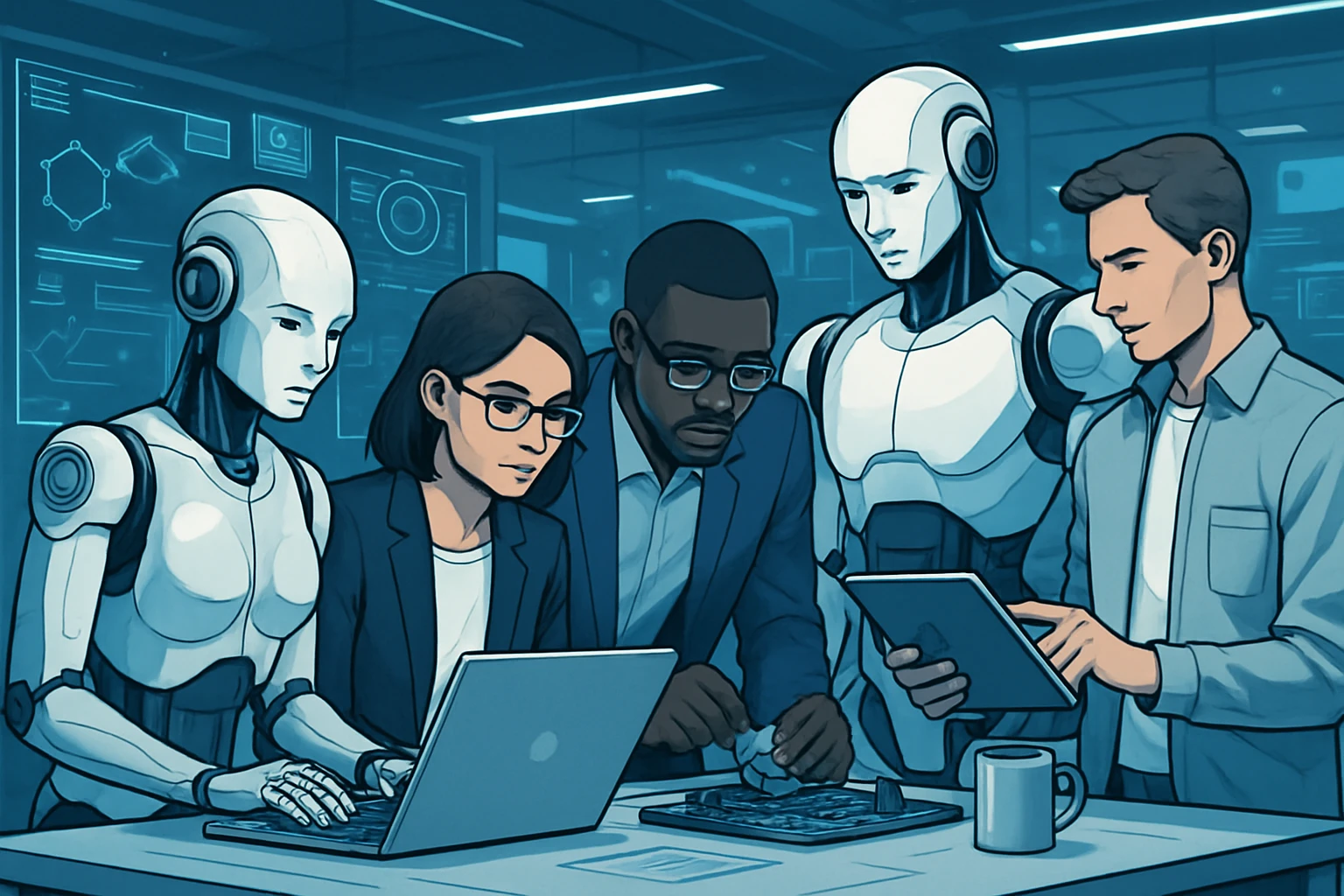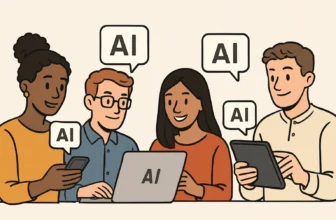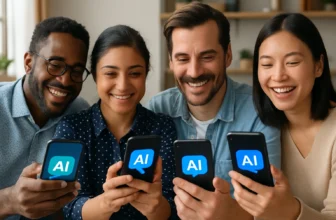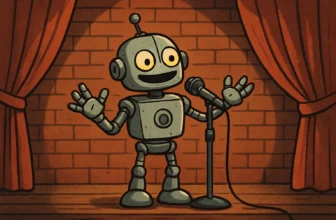
Why These AI Startups Matter in 2025
Did you know that over 77% of devices we use daily will be powered by some form of artificial intelligence by 2025? I mean, let that sink in. That’s your phone, your car, your fridge… maybe even your coffee maker making sassier decisions than you before your first cup of java.
Now, I know the term “AI” gets tossed around like confetti at a startup pitch meeting. We’ve all heard it: “disrupting industries,” “revolutionizing workflows,” “unlocking human potential.” But here’s where it gets real—AI isn’t just smart tech anymore. It’s becoming creative, empathetic, and—dare I say?—a little rebellious (in a good way).
So why should we care about AI startups in 2025? Because these aren’t your typical big-tech giants tweaking algorithms for ad revenue. Nope. These five companies we’re about to explore are the ones asking bold questions: What if machines could design smarter cities? What if your mental health coach lived in your pocket—and actually understood you?
And trust me, this is not far-off sci-fi stuff. This is happening now. I’ve been following these trailblazing teams for a while, and what they’re doing is equal parts mind-blowing and seriously impactful. One founder I spoke with put it perfectly: “We’re not just building tech, we’re building trust between humans and machines.” Chills, right?
Here’s what to look for in these AI rising stars:
- Real-world problem solving: These startups are tackling everything from climate change modeling to personalized healthcare—not just building cool, pointless gadgets.
- Technology innovation at the core: Whether it’s neurosymbolic AI or explainable learning systems, the tech here isn’t just flashy. It works—and it works smart.
- Human-first design: We’re talking about AI that plays nice with people. Think intuitive interfaces, ethical algorithms, and products that fit seamlessly into your daily life.
Personally, I love seeing how these AI ideas are solving things in creative, almost artful ways. Like one startup that blends machine learning with neuroscience to help stroke patients regain speech. Can you imagine? That’s not just innovation—it’s hope, coded into lines of Python.
If all this sounds futuristic, that’s because it is. But it’s also now. These startups are changing the way we live, work, connect and even dream about what’s possible. So yeah, buckle up. Because if AI 2025 is anything like what’s brewing behind these founders’ screens, we’re in for one wild, amazing ride.
Ready to meet the five AI startups that are about to make history? Let’s jump in.
Startup A: Pioneering Healthcare AI
Did you know the average doctor spends nearly 1/3 of their day just dealing with data entry? Yikes, right? That’s hours of staring at patient charts, lab results, and endless notes—time that could be spent, you know, actually caring for patients. And if you’ve ever waited forever for a diagnosis or spent days wondering why your blood test results are stuck in limbo… you’ve felt what data overload looks like in real life.
This is exactly the chaos Startup A is tackling head-on—with some seriously cool AI magic. Imagine a world where a patient’s entire medical history, test results, prescriptions, and even real-time symptoms could be analyzed in seconds. Not hours, not days—seconds.
I had a chat with a friend who works at a busy hospital in New York. She said the amount of data they handle daily is like drinking from a firehose. She spends more time clicking through digital paperwork than actually talking to patients. But thanks to a beta program with Startup A’s system, they were able to flag potentially dangerous drug interactions before the doctor even walked into the room. That’s not just helpful—it could save lives.
So, how’s Startup A changing the game?
- AI that thinks fast: Their technology can analyze complex health records in real-time. It pulls together info from EHRs (Electronic Health Records), lab results, and patient inputs without making your laptop cry. It’s like giving your doctor a super-smart sidekick that never sleeps.
- Smart alerts (without being annoying): The tool doesn’t just spit out alerts for the sake of it. It uses context to prioritize the stuff that actually matters—like early signs of sepsis or dosage issues—so clinicians don’t drown in pop-ups they learn to ignore.
- Better communication: The AI even helps bridge gaps between departments. Less “email tag” between radiologists and primary care doctors, and more timely decisions for the people who actually need them—you and me.
Plus, one of the coolest parts? They’re working on wearable integration. Picture this: your smartwatch pings your doc if something’s off, and the AI instantly compares your readings to your medical history and recommends next steps. That’s not tomorrow tech—it’s almost here. Wild, right?
Why this matters
We all want faster, smarter, and more personalized healthcare. But doctors aren’t robots, and the mountain of data they’re expected to navigate is only growing. Startup A helps offload that pressure with tools that support—not replace—the people we count on most.
The future of healthcare? It’s all about precision at lightning speed, and Startup A is already paving the road. So next time you’re stuck waiting for answers in a cold exam room, just know—help might be getting smarter, faster, and way more human, thanks to AI like this.✨
Startup B: AI in Environment Protection
Did you know that climate-related disasters have increased fivefold over the last 50 years? Yep. Fires, floods, hurricanes—you name it. It’s scary stuff. And it’s easy to feel powerless, like we’re just watching the Earth buckle under everything we’re throwing at it. But here’s a feel-good plot twist: Startup B is stepping in like a digital superhero. And their sidekick? Artificial Intelligence.
Let me ask you something—have you ever thought, “It’s just too big of a problem for me to fix”? Same here. It’s hard to feel like one person can make a difference when sea levels are rising and forests are vanishing. But I’ve also learned that big change often starts with bold ideas. Startup B is one of those ideas.
So what exactly are they doing? Let’s break it down:
- They’re using AI to predict natural disasters—and not just in a forecasting kind of way. They’re feeding massive amounts of satellite and climate data into machine learning models to spot environmental shifts *before* they turn dangerous. Think early flood warnings, wildfire risk alerts. Basically, they’re making Mother Nature a little more predictable.
- They’re building tools for local communities—and this is what I love. They’ve created an AI dashboard that local governments and nonprofits can use. It’s not some abstract corporate tool. It’s super practical. If you live in a flood-prone area, for instance, this tech gives emergency services a heads-up days earlier than traditional systems. That’s precious time saved. Literally.
- They’re all about real-time action—because what’s the point of knowing a storm is coming if you can’t act on it? Their system automates alerts to local communities, updating in real-time. So when danger brews, people actually have enough time to get to safety.
A friend of mine volunteers in a small environmental coalition in Northern California—it’s beautiful, but every fire season is absolutely nerve-wracking. After partnering with Startup B, they started using its wildfire risk alerts. Last season, they were able to warn residents before the blaze even made it near homes. That’s lives protected. Houses saved. And a whole lot of stress reduced.
And here’s what blew me away: Startup B’s system increased evacuation efficiency by over 30% in trial communities. That’s not future potential. That’s happening right now. And imagine scaling this impact globally? Forget just reducing damage—we’re talking about saving ecosystems, families, entire towns.
Feeling hopeful?
If the crisis feels huge, it’s because it is. But tech like this reminds us that innovation isn’t all about flash and profit—it can be about heart too. If AI can give us a clearer look into the future of our planet, maybe we can finally start turning this thing around.
So yeah, Startup B might not solve global warming overnight, but they’re making Earth a little safer, smarter, and more prepared—one algorithm at a time. And that? That’s the kind of tech we need more of.
Startup C: AI Redefining Education
Did you know that nearly 70% of students say their school’s one-size-fits-all teaching methods just… don’t work for them? Yikes, right?
If you’ve ever zoned out in class because the lesson felt too fast, too slow, or just not your thing, you already know the struggle. Traditional education systems often forget that we all learn differently. Some of us are visual thinkers, others need hands-on practice, and a few (like me!) grasp things through storytelling. But when every student gets the same worksheet and lecture, who really wins?
That’s where Startup C comes in—and honestly, it’s kind of a game-changer. They’re flipping the old-school education model on its head by building AI-powered learning platforms that actually adapt to the student. Think Netflix recommendations, but for your brain and schoolwork. Cool, right?
The Problem: Learning That’s Not Built for You
Here’s the deal—students across the globe are dealing with outdated teaching methods that treat everyone the same, whether they’re a math whiz or struggling with basic fractions. That not only damages confidence, but straight-up limits potential.
I saw it firsthand with my cousin Maya. She’s brilliant but learns better with visuals and needs time to digest information. Her school didn’t accommodate that, which made her feel like she was falling behind. (Spoiler alert: she’s now thriving, thanks to a personalized learning app—guess who built it? Yep. Startup C!)
The Solution: Tailored Learning with AI
Startup C’s platform uses AI to analyze how a student learns best—their speed, interests, strengths, and struggles—then serves content that matches that style. It’s like having a tutor who knows you inside out and never gets tired.
Here’s what makes it so effective:
- Real-time Adaptation: The AI adjusts the material based on performance. Stuck on algebra? It’ll slow down and offer new approaches.
- Gamified Learning: Interactive quizzes, story-driven lessons, and even VR segments keep students engaged and coming back.
- Progress Tracking: Students (and parents or teachers) get clear, visual dashboards showing exactly what’s working and what needs love.
Plus, the tech isn’t just for elite schools or fancy devices—it has mobile compatibility and offline functionality for students in underserved regions. That alone gets a standing ovation from me.
A Glimpse Into the Future
Imagine a world where every kid wakes up excited to learn because the lessons feel made just for them. No more one-size-fits-none textbooks. Instead, they’d have a hyper-intelligent learning companion that cheers them on, course-corrects when needed, and grows with them.
Startup C wants to make that world a reality, and honestly? They’re already halfway there.
If you’re a parent, educator, or just someone rooting for a smarter generation, keep Startup C on your radar. Personalized education isn’t just the future—it’s happening now. And thanks to startups like this one, it’s finally within reach.
Startup D: AI Transforming Urban Living
Did you know that the average city commuter spends over 100 hours a year stuck in traffic? Yep—over four entire days of honking horns, red lights, and slow crawls. That’s not just frustrating; it’s time we’ll never get back. But here’s where it gets exciting: Startup D is determined to flip the script and make urban life, well… smarter.
We all feel it. Cities are getting denser, busier, and—let’s be honest—a little more chaotic. I live downtown, and just walking three blocks can feel like a strategic mission during rush hour. Crosswalks, delivery trucks, e-scooters weaving in and out—it’s a lot. Add in unpredictable energy usage and outdated infrastructure, and you’ve got a recipe for inefficiency.
That’s where Startup D steps in. They’re not just tossing around buzzwords like “smart city” for fun. These folks are using real-time AI to overhaul the way our cities operate, and it’s seriously cool.
So, what are they actually doing?
- Predictive Traffic Flow: Ever wish the stoplights just *knew* when to turn green? Startup D integrates high-level data from cameras and road sensors to dynamically change light patterns based on real-time traffic. Forget sitting at red lights with zero cars coming the other way.
- Energy Optimization: They’re connecting public buildings and neighborhoods to a centralized AI system that monitors energy usage, adjusts lighting and heating, and redirects resources to where they’re needed most. Think of it as a city with an energy sixth sense.
- Emergency Response Boost: Imagine if streetlights turned green for ambulances, or fire truck routes were cleared ahead of time. Startup D’s system learns from every incident and optimizes the response pathways in real time. It’s like giving your city a brain—and a very smart one, at that.
And the results? Already making waves.
One pilot city saw a 22% reduction in traffic congestion within six months of implementing the system. Can you *imagine* reclaiming that time? That’s hours saved, gas not wasted, air not polluted, and stress just… poof, lowered.
I actually visited a friend recently in one of their early launch zones. He joked that the city felt like it “knew what he was doing before he did”—taking the faster route, avoiding gridlock, arriving on time without sprinting. As someone who’s perpetually running five minutes behind… I was sold.
Why this matters for you and me
Whether you live in a city or just visit often, this is the kind of transformation that touches daily life. Startup D is a reminder that AI isn’t just for rocket science or billion-dollar enterprises—it’s for your morning commute, your power bill, and your peace of mind.
So what can you do today?
- Stay curious: If your city’s talking about “smart” upgrades, dig into it. Public feedback can influence adoption.
- Support innovation: Advocate for funding and pilot projects in your community.
- Think beyond convenience: These AI systems can reduce emissions, save lives, and improve quality of life.
Urban life doesn’t have to mean chaos and congestion. With companies like Startup D leading the way, it’s looking more like a futuristic dream—with green lights all the way. Let’s lean into it and help build cities that think as fast as we do.
Embrace the AI Revolution
Did you know that over 77% of devices we use daily already rely on some form of AI? Yep—even your phone’s autocorrect, your binge-list recommendations, and that fitness tracker shaming you into walking more… all AI-powered. But here’s the kicker: we’re just scratching the surface.
If you’ve ever scrolled through yet another “AI is changing the world” headline and thought, “Okay, cool… but what does it really mean for me?”—you’re not alone. Honestly, it can feel a little overwhelming. Robots taking jobs? Computers writing novels? Machines thinking for themselves? I mean, what even is going on?
But here’s the real deal: AI isn’t some sci-fi dystopian takeover. It’s actually a huge opportunity—especially when you see what these incredibly bold startups are doing with it. They’re not replacing humans, they’re empowering us. They’re making tech more intuitive, life more streamlined, and innovation more accessible. And that? That’s huge.
So, How Do We Embrace This AI Wave Without Wiping Out?
- Stay curious, not cautious. Remember when smartphones sounded intimidating? Now we can’t live without them. Same goes for AI. Take time to poke around new tools (hello, ChatGPT!), sign up for beta products, or just follow an AI-focused newsletter to keep your finger on the pulse.
- Skill up—at your pace. You don’t need to become an ML engineer overnight. Platforms like Coursera, Skillshare, or even YouTube have bite-sized intros to AI concepts tailored for creatives, marketers, entrepreneurs—you name it.
- Think collaboration, not competition. Instead of worrying about machines replacing us, think of how they can support us. Maybe it’s AI helping you brainstorm content ideas, analyze your business trends faster, or even customize your workout routine. Start small and explore how it fits into your daily world.
I’ll share something personal: when I first dipped my toes into the AI space, I resisted. Hard. It felt like this foreign, technical monster I had no business trying to understand. But the moment I used a simple AI tool to boost my productivity—and saw real, tangible results? I was hooked. Game. Changer.
The startups we’ve talked about in this blog? They’re not just building products. They’re shaping entire ways of living, learning, and connecting. Whether it’s a healthcare breakthrough or a smarter home assistant, AI is gently weaving itself into the fabric of our lives—and making it a whole lot more magical.
So, what’s next? Go try one of the startups we covered. Chat with an AI bot. Read up on what’s coming next. Get familiar, get excited.
The future isn’t coming—it’s already here. And now’s the perfect time to grab a front-row seat. You in?












